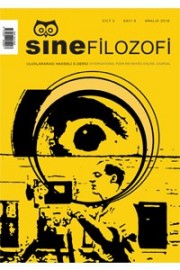Göstergebilimsel Film Çözümlemelerinin Bergsoncu Eleştirisi
Bergsonesk Critique of Semiotic Film Analysis
Author(s): Mustafa Kemal SancarSubject(s): Semiology, Methodology and research technology, Film / Cinema / Cinematography
Published by: Serdar Öztürk
Keywords: Semiotics; Film Criticism; Intuition; Henri Bergson;
Summary/Abstract: The semiotics studies based on Ferdinand de Saussure and Charles Sanders Peirce were used by Christian Metz as a method of cinema analysis. Metz, who described cinema as a language, it is the sum of the shootings, which is the smallest sign unit of the films. Accordingly, it is possible to reveal hidden meanings in film by revealing the structural relations between the indications. The aim of this study is to criticize the assumptions of the semiotics for films and the method of analyzing the films. Henri Bergson’s philosophical arguments were used for this critique. According to Bergson, the human mind perceives things in two different ways: through intelligence and intuition. Intelligence has the ability to perceive what is constant in your life. For this reason, things that happen in the flow of life can be perceived only by being stopped and conceptualized by intelligence. Intuition has the ability to perceive things in the flow. A film has intuitive meanings that can be perceived only in the film flow, as well as the constant things perceived by intellect. The semiotic film analysis leave out the meaning levels that can be comprehended by this intuition. In a film analysis, film is all possible in the universe but in a literary language. Because the meanings of the film in the flow of watching can only be described in a literary style.
Journal: SineFilozofi
- Issue Year: 3/2018
- Issue No: 6
- Page Range: 23-38
- Page Count: 16
- Language: Turkish

